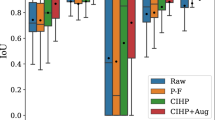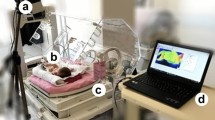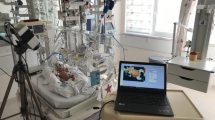Abstract
Controlling thermal environment in incubators is essential for premature infants because of the immaturity of neonatal thermoregulation. Currently, medical staff manually adjust the temperature in the incubator based on the neonatal skin temperature measured by a probe. However, the measurement by the probe is unreliable because the probe easily peels off owing to immature skin of the premature infant. To solve this problem, recent advances in infrared sensing enables us to measure the skin temperature without discomfort or stress to the premature infant by using a thermal camera. The key challenge is how to extract skin temperatures of different body parts such as left/right arms, body, head, etc. from the thermal images. In this paper, we propose a method to detect the body parts from the neonatal thermal image by using deep learning. We train YOLOv5 to detect six body parts from thermal images. Since YOLOv5 does not consider relative positions of the body parts, we leverage the decision tree to check consistency among the detected body parts. For evaluation, we collected 4820 thermal images from 26 premature infants. The result shows that our method achieves precision and recall of 94.8% and 77.5%, respectively. Also, we found that the correlation coefficient between the extracted neck temperature and the esophagus temperature is 0.82, which is promising for non-invasive and reliable temperature monitoring for premature infants.
Access this chapter
Tax calculation will be finalised at checkout
Purchases are for personal use only
Similar content being viewed by others
References
Cao, Z., Hidalgo Martinez, G., Simon, T., Wei, S., Sheikh, Y.A.: OpenPose: realtime multi-person 2D pose estimation using part affinity fields. IEEE Trans. Pattern Anal. Mach. Intell. 43(1), 172–186 (2019)
Chen, I.C., Wang, C.J., Wen, C.K., Tzou, S.J.: Multi-person pose estimation using thermal images. IEEE Access 8, 174964–174971 (2020)
Knobel, R.B.: Thermal stability of the premature infant in neonatal intensive care. Newborn Infant Nurs. Rev. 14(2), 72–76 (2014)
Krišto, M., Ivašić-Kos, M.: An overview of thermal face recognition methods. In: Proceedings of International Convention on Information and Communication Technology, Electronics and Microelectronics (MIPRO), pp. 1098–1103 (2018)
Ali, M., Abdelwahab, M., Awadekreim, S., Abdalla, S.: Development of a monitoring and control system of infant incubator. In: Proceedings of International Conference on Computer, Control, Electrical, and Electronics Engineering (ICCCEEE), pp. 1–4 (2018)
Redmon, J., Divvala, S., Girshick, R., Farhadi, A.: You only look once: unified, real-time object detection. In: Proceedings of IEEE Conference on Computer Vision and Pattern Recognition (CVPR), pp. 779–788 (2016)
Rezatofighi, H., Tsoi, N., Gwak, J., Sadeghian, A., Reid, I., Savarese, S.: Generalized intersection over union. In: Proceedings of IEEE Conference on Computer Vision and Pattern Recognition (CVPR), pp. 658–666 (2019)
Smith, L.N.: Cyclical learning rates for training neural networks. In: Proceedings of IEEE Winter Conference on Applications of Computer Vision (WACV), pp. 464–472 (2017)
Author information
Authors and Affiliations
Corresponding author
Editor information
Editors and Affiliations
Rights and permissions
Copyright information
© 2022 ICST Institute for Computer Sciences, Social Informatics and Telecommunications Engineering
About this paper
Cite this paper
Beppu, F., Yoshikawa, H., Uchiyama, A., Higashino, T., Hamada, K., Hirakawa, E. (2022). Body Part Detection from Neonatal Thermal Images Using Deep Learning. In: Hara, T., Yamaguchi, H. (eds) Mobile and Ubiquitous Systems: Computing, Networking and Services. MobiQuitous 2021. Lecture Notes of the Institute for Computer Sciences, Social Informatics and Telecommunications Engineering, vol 419. Springer, Cham. https://doi.org/10.1007/978-3-030-94822-1_24
Download citation
DOI: https://doi.org/10.1007/978-3-030-94822-1_24
Published:
Publisher Name: Springer, Cham
Print ISBN: 978-3-030-94821-4
Online ISBN: 978-3-030-94822-1
eBook Packages: Computer ScienceComputer Science (R0)




